10+ School Lease Agreement Examples to Download
A lot of people may think that the solution to overcrowded schools is to lease a different place in order to lessen the number of students in the first place. But what they may never know or notice is that leasing a school or a commercial building to make it into a school is not as easy as it may sound. When you were an elementary school student, have you ever wondered why there were a lot of school buses in your school? Have you ever asked your school superintendent about them? As students, we believe that the buses that take us to school are owned by the school and that if there are other places that would want to borrow the school bus, all they had to do was to ask.
10+ School Lease Agreement Examples
1. Elementary School Lease Agreement
2. National School Lease Agreement
3. Charter School Lease Agreement
4. School Lease Agreement Information Sheet
5. Central School District Lease Agreement
6. School Board Lease Agreement
7. School Facility Lease Agreement
8. School Buses Lease Agreement
9. Printable School Lease Agreement
10. Unified School Lease Agreement
11. Separate School Lease Agreement
What Is a School Lease Agreement?
A school lease agreement is a document between the lessor and the lessee. The lessor is an outside party who gives permission to the lessee or the owner or the school board to lease or rent out a piece of land or a building to the school. The reasons can vary but the general one is to make sure that there is still some space for schools to avoid any overpopulation. Depending on the board of directors in the school, the school lease agreement can be made temporary or permanent. It may also depend on the lessor or the outside party whom the board of directors have made a lease agreement with.
How to Write a School Lease Agreement
Are you a board of director looking for a school lease agreement? Have you found someone who plans on leasing out a property or a commercial building to be turned into a school building? Here are some tips to get you started with a school lease agreement.
1. Lessor and Lessee’s Names Printed
From the very beginning of the agreement, you are required to write your complete names in the agreement: the lessor’s full name and the lessee’s full name, the address of the school, and the position you hold in the school.
2. School Agreement Terms and Conditions
The agreement between the lessor and the lessee in order for the lessee to rent. The terms and conditions are mainly from the lessor. The lessee has to agree to the conditions. The conditions can vary from the price range, the date of payments, and the duration of the lease.
3. Payment Schedules and Length of Agreement
This is an important part of the agreement in order for both parties to know when the payment is scheduled and the length of the agreement to be valid. The lessor’s responsibility in the agreement is to add how long the leasing for the property or the land is to the lessee. If the lessor may want to get the property back, the lessor must at least write a letter of termination.
4. Signature, Date, and Copies
Last but definitely not least, include the signature of both the lessor and the lessee, the date when it was being signed, and the duplicate copy of the agreement. The duplicate copy of the agreement must be given to the lessee.
FAQs
What is a school lease agreement?
A school lease agreement is a documented agreement that is made between the lessor and the lessee. The agreement consists of the terms and conditions of the lessor in order for the lessee to be able to rent out the place. The school lease agreement is made in order to bind two or more parties to the agreement.
What is the importance of a school lease agreement?
The importance of a school lease agreement is to bind two parties to what they have discussed and agreed on. Without an agreement, there would be some misunderstandings that may lead to some issues and trouble. This is why to avoid any of this from happening, a written document between them is necessary as well.
How many terms and conditions are needed?
The conditions of the agreement will depend mostly on the lessor. The common conditions often include the payment, the number of students, and the number of personnel who may be using the building. The length of use as well is part of the conditions.
When it comes to leasing, may it be a property or a commercial building that you would be using to place students in another place, agreements are needed. When you plan on something with another party, verbal agreements are not going to be enough. Always make sure to have both a verbal and written agreement that binds both of you to what you have discussed and accepted.
10+ School Lease Agreement Examples to Download
![10+ School Lease Agreement Examples [ Elementary, Charter, Bus ]](https://images.examples.com/wp-content/uploads/2021/05/10-School-Lease-Agreement-Examples-Elementary-Charter-Bus-.jpg)
A lot of people may think that the solution to overcrowded schools is to lease a different place in order to lessen the number of students in the first place. But what they may never know or notice is that leasing a school or a commercial building to make it into a school is not as easy as it may sound. When you were an elementary school student, have you ever wondered why there were a lot of school buses in your school? Have you ever asked your school superintendent about them? As students, we believe that the buses that take us to school are owned by the school and that if there are other places that would want to borrow the school bus, all they had to do was to ask.
10+ School Lease Agreement Examples
1. Elementary School Lease Agreement
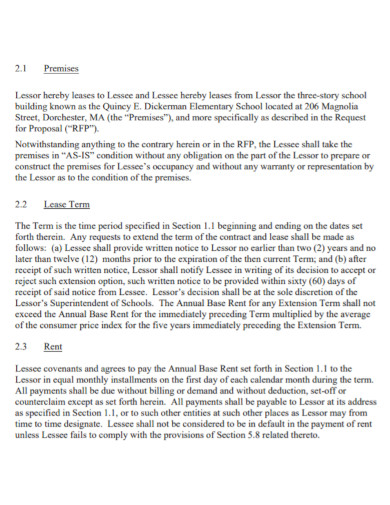
crpe.org
Details
File Format
PDF
Size: 69 KB
2. National School Lease Agreement
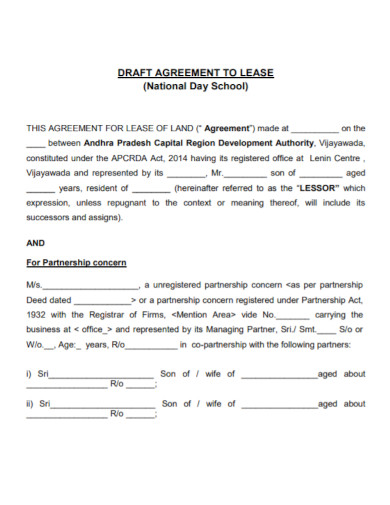
crda.ap.gov.in
Details
File Format
PDF
Size: 324 KB
3. Charter School Lease Agreement
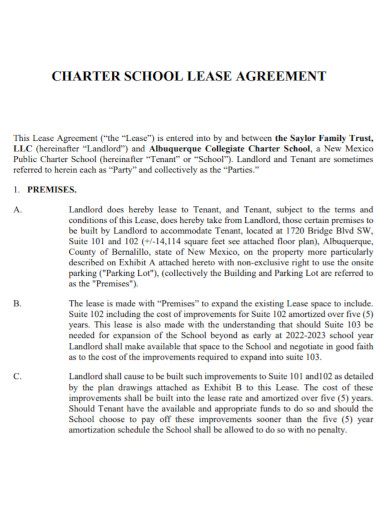
nmpsfa.org
Details
File Format
PDF
Size: 212 KB
4. School Lease Agreement Information Sheet
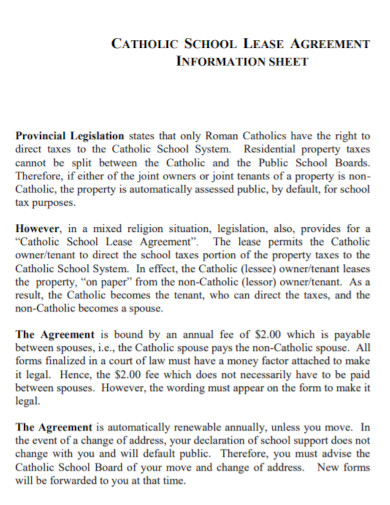
rccdsb.edu.on.ca
Details
File Format
PDF
Size: 114 KB
5. Central School District Lease Agreement
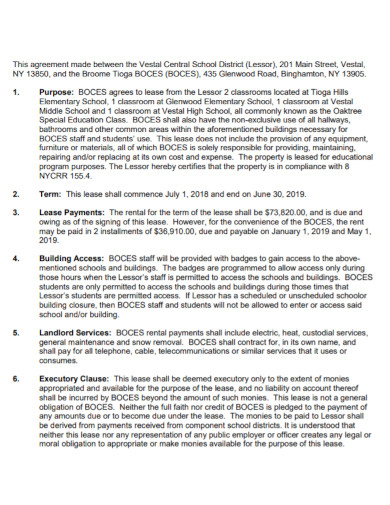
vestal.stier.org
Details
File Format
PDF
Size: 364 KB
6. School Board Lease Agreement
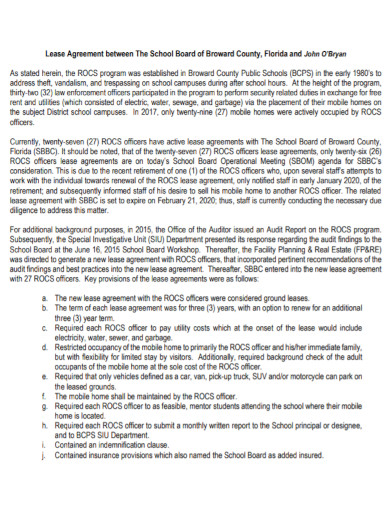
bcpsagenda.browardschools.com
Details
File Format
PDF
Size: 121 KB
7. School Facility Lease Agreement
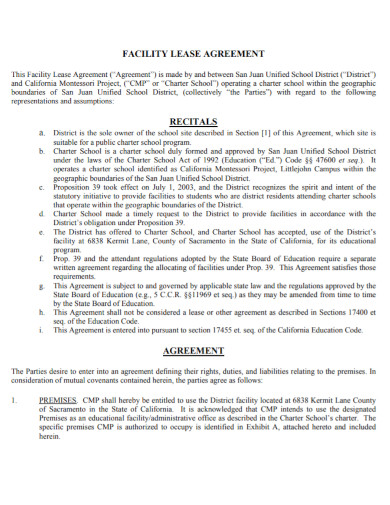
cacmp.org
Details
File Format
PDF
Size: 389 KB
8. School Buses Lease Agreement
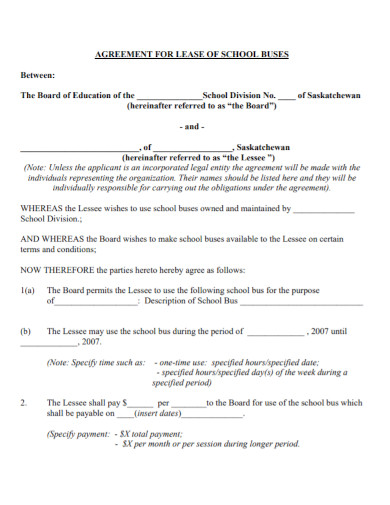
saskschoolboards.ca
Details
File Format
PDF
Size: 15 KB
9. Printable School Lease Agreement
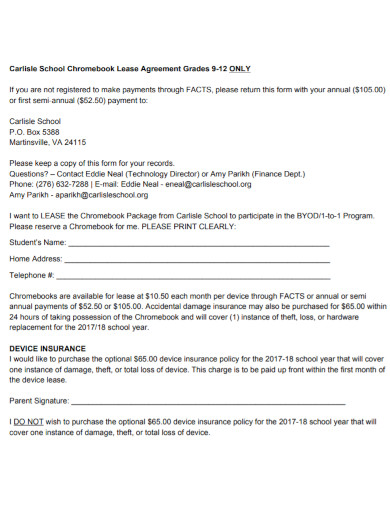
carlisleschool.org
Details
File Format
PDF
Size: 102 KB
10. Unified School Lease Agreement
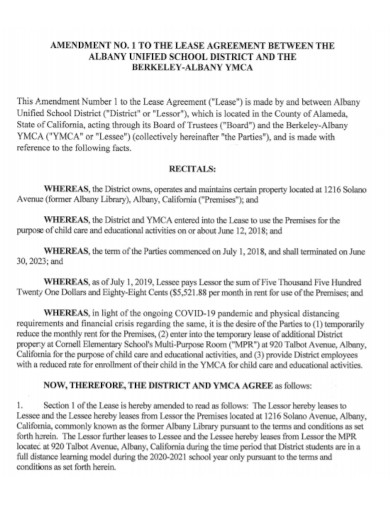
albanyca.granicus.com
Details
File Format
PDF
Size: 989 KB
11. Separate School Lease Agreement
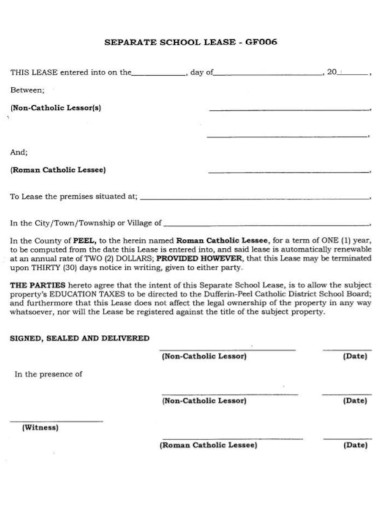
dpcdsb.org
Details
File Format
PDF
Size: 248 KB
What Is a School Lease Agreement?
A school lease agreement is a document between the lessor and the lessee. The lessor is an outside party who gives permission to the lessee or the owner or the school board to lease or rent out a piece of land or a building to the school. The reasons can vary but the general one is to make sure that there is still some space for schools to avoid any overpopulation. Depending on the board of directors in the school, the school lease agreement can be made temporary or permanent. It may also depend on the lessor or the outside party whom the board of directors have made a lease agreement with.
How to Write a School Lease Agreement
Are you a board of director looking for a school lease agreement? Have you found someone who plans on leasing out a property or a commercial building to be turned into a school building? Here are some tips to get you started with a school lease agreement.
1. Lessor and Lessee’s Names Printed
From the very beginning of the agreement, you are required to write your complete names in the agreement: the lessor’s full name and the lessee’s full name, the address of the school, and the position you hold in the school.
2. School Agreement Terms and Conditions
The agreement between the lessor and the lessee in order for the lessee to rent. The terms and conditions are mainly from the lessor. The lessee has to agree to the conditions. The conditions can vary from the price range, the date of payments, and the duration of the lease.
3. Payment Schedules and Length of Agreement
This is an important part of the agreement in order for both parties to know when the payment is scheduled and the length of the agreement to be valid. The lessor’s responsibility in the agreement is to add how long the leasing for the property or the land is to the lessee. If the lessor may want to get the property back, the lessor must at least write a letter of termination.
4. Signature, Date, and Copies
Last but definitely not least, include the signature of both the lessor and the lessee, the date when it was being signed, and the duplicate copy of the agreement. The duplicate copy of the agreement must be given to the lessee.
FAQs
What is a school lease agreement?
A school lease agreement is a documented agreement that is made between the lessor and the lessee. The agreement consists of the terms and conditions of the lessor in order for the lessee to be able to rent out the place. The school lease agreement is made in order to bind two or more parties to the agreement.
What is the importance of a school lease agreement?
The importance of a school lease agreement is to bind two parties to what they have discussed and agreed on. Without an agreement, there would be some misunderstandings that may lead to some issues and trouble. This is why to avoid any of this from happening, a written document between them is necessary as well.
How many terms and conditions are needed?
The conditions of the agreement will depend mostly on the lessor. The common conditions often include the payment, the number of students, and the number of personnel who may be using the building. The length of use as well is part of the conditions.
When it comes to leasing, may it be a property or a commercial building that you would be using to place students in another place, agreements are needed. When you plan on something with another party, verbal agreements are not going to be enough. Always make sure to have both a verbal and written agreement that binds both of you to what you have discussed and accepted.

